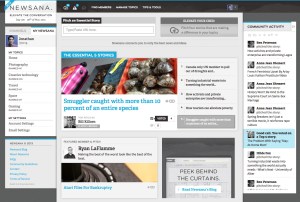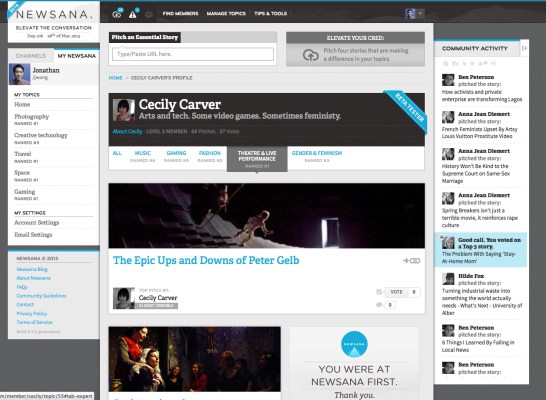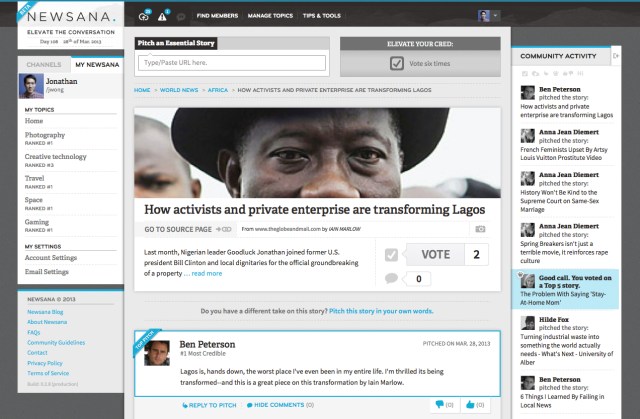During their time with Journalists For Human Rights, Canada’s largest media development NGO, Ben Peterson and Jonathan Wong helped train local journalists in sub-saharan Africa on how best to report on human rights, governance (or lack thereof) and uphold the fourth estate. To help them teach these aspiring reporters, the friends looked for the best examples of Human Rights journalism. But all they found was a fire hose of news content, and the Herculean struggle of to find the best stories amidst all the noise.
Peterson tells us that this challenge quickly led them to ask, “wouldn’t it be great if we could get a group of Human Rights experts to find the best articles for us?” The answer to this question took shape in a platform called, Newsana, which the founders are officially launching today. Founded in early 2012 as an answer to the challenge of finding the best Human Rights news content, Peterson and Wong soon realized that their expert-driven crowdsourcing solution could be used for any topic.
The co-founders joined forces with a team of developers and social media experts and spent the next seven months building out the platform. Informed by the rise and fall of sites like Digg, Newsana looks to combine the best of community-based, social news sites (a la Reddit) with expert-driven curation. Unlike others of its ilk, the platform is looking to become an exclusive online community targeted at those who are “passionate about learning and discussing news and ideas,” Peterson says.
Those looking to help curate the news and have a particular area of expertise they’re interested can apply to become members of the platform. Newsana then screens these “experts,” and once accepted, allows them to choose the content they want to share and discuss. Members can vote on their favorite stories of the day, and Newsana uses its algorithms to post top stories across 35 categories (at launch), including Business, Arts and Entertainment, Lifestyle, Media, Politics and Technology.
Based on community activity, the top five stories in each category are then served in those verticals for anyone and everyone to consume. So, anyone can read and consume Newsana’s stop stories, but if you want to vote, pitch stories or engage others in conversation, you have to be logged in. Once accepted, members can invite 10 new people per week.
“The biggest challenge for us,” Peterson tells us, “is to keep the quality high. While we love and respect Reddit and strive for the same kind of community interaction, we don’t want to become just another social, news-sharing clone.” That’s why Newsana has opted for an invite-only system, to help it curate its community and reward constructive activity. To that end, within each vertical, the site ranks members based on their contributions, and the higher their rank, the more weight their activities are given on the site.
“We think that our ultimate value offering is to provide the most essential, quality news quicker than anywhere else,” Peterson says. While Twitter is a shotgun blast of news, as are Google news and RSS feeds, Newsana distills each category down to five critical topics, populating those categories with content chosen by experts.
 At launch, the startup’s goal is to expand its member base, although the co-founders aren’t sure yet what the ideal number of contributing members will be; “we’re going to wait and see on that one,” the co-founder tells us. But, eventually, we want to have millions of experts and hundreds of thousands of topics. In the long-term, we want to become a historical guide, where you can find the most essential stories from two months ago, a year ago, or 50 years ago.
At launch, the startup’s goal is to expand its member base, although the co-founders aren’t sure yet what the ideal number of contributing members will be; “we’re going to wait and see on that one,” the co-founder tells us. But, eventually, we want to have millions of experts and hundreds of thousands of topics. In the long-term, we want to become a historical guide, where you can find the most essential stories from two months ago, a year ago, or 50 years ago.
In terms of monetization, a potential stumbling block for any news aggregator, Peterson says that the company’s first priority is to build out a strong community and, once that is in place, the team “will work with them on the best way to monetize.” When pressed, the founder says that their first approach will likely center around providing native, branded content from sponsors — the same method Techmeme employs for its tech news aggregator.
To date, Newsana has raised $500K in seed financing from a group of Canadian angel investors, including Gary Slaight (President and CEO, Slaight Communications), Prem Watsa (Chairman and CEO Fairfax Financial Holdings) and Mohammad Al Zaibak (President and CEO, Canadian Development and Marketing Corp).
Going forward, in the next couple of weeks, Newsana plans to release an iOS app and begin offering an email newsletter with notifications to allow users to consume news in weekly email digests. The team will also look to take design and UX cues from popular newsreaders like Flipboard as it looks to build out Newsana’s mobile footprint.
“Over 70 percent of individuals online feel overwhelmed with the information available to them,” Peterson says. “Newsana was designed to solve this problem for our members because they don’t have to filter through all the noise and chatter to access the relevant content they want. We like to think of Newsana as the ‘News Nirvana’.”
For more, find Newsana at home here.

